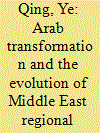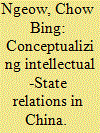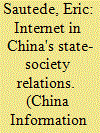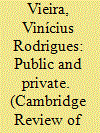| Srl | Item |
| 1 |
ID:
125384


|
|
|
|
|
| Publication |
2013.
|
| Summary/Abstract |
Since its outbreak in the beginning of 2011, the Arab transformation that swept almost the whole middle east has now entered the third year with its geopolitical implications beginning to unfold gradually. When erupted in Tunisia and Egypt, it was driven primarily by internal dynamics and was regarded as a genuine local, bottom up movement in general. Much to people's surprise, incumbent regimes such as the Mubarak regimes in Egypt and Ben Ali regime in Tunisia that were once considered to be durable and formidable were too quick to be overthrown.
|
|
|
|
|
|
|
|
|
|
|
|
|
|
|
|
| 2 |
ID:
078198


|
|
|
| 3 |
ID:
129448


|
|
|
|
|
| Publication |
2013.
|
| Summary/Abstract |
This article explores how state and society relations have been affected by the development of information technology in China over the past 20 years. It argues that despite all the transformative changes that such technology has helped bring about, 'benefits' have to be weighed in terms of both empowerment of society and strengthening of state capacity. Ultimately, the digital challenge has not translated into a weakening of the authoritarian state, and this can be explained by the very nature of the party-state in China and how it has managed to make use of communication tools that prove to be both constructive and divisive.
|
|
|
|
|
|
|
|
|
|
|
|
|
|
|
|
| 4 |
ID:
129576


|
|
|
|
|
| Publication |
2014.
|
| Summary/Abstract |
The current literature on comparative political economy does not seem to consider unifying under a single theoretical framework the analysis of continuity and change in different economic systems. On the one hand, major comparative works derive their theoretical propositions from dynamics in the Western world. On the other, studies that are focused on national trajectories of development are concentrated in cross-national comparisons involving countries with similar characteristics in what concerns strategies of development. In this paper, I argue that all fields in the world of social action are pervaded by two major fields, hereby dubbed 'meta-fields': public and private. Both are in a 'double movement' to shape each other's boundaries through the definition of social and property rights that regulate access to human capabilities and capital. Public and private are meta-fields because they constrain human action and the organization of social configurations on state and non-state levels.
|
|
|
|
|
|
|
|
|
|
|
|
|
|
|
|
| 5 |
ID:
079479


|
|
|
|
|
| Publication |
2007.
|
| Summary/Abstract |
In this article we draw upon religious sermons, poetry and first-person accounts to show how rural Sri Lankans used localized meanings of security and sacrifice to mobilize against a project of national development. Using Victor Turner's concept of social drama and the idea that state officials and citizens relate as audiences of each others' actions, we bring the methodological lens of performance to the study of citizenship, development, and legitimacy. The authors find that people's attempt to transform everyday meaning into legitimate meaning forms a profound kernel in the process of making of state-society relations
|
|
|
|
|
|
|
|
|
|
|
|
|
|
|
|